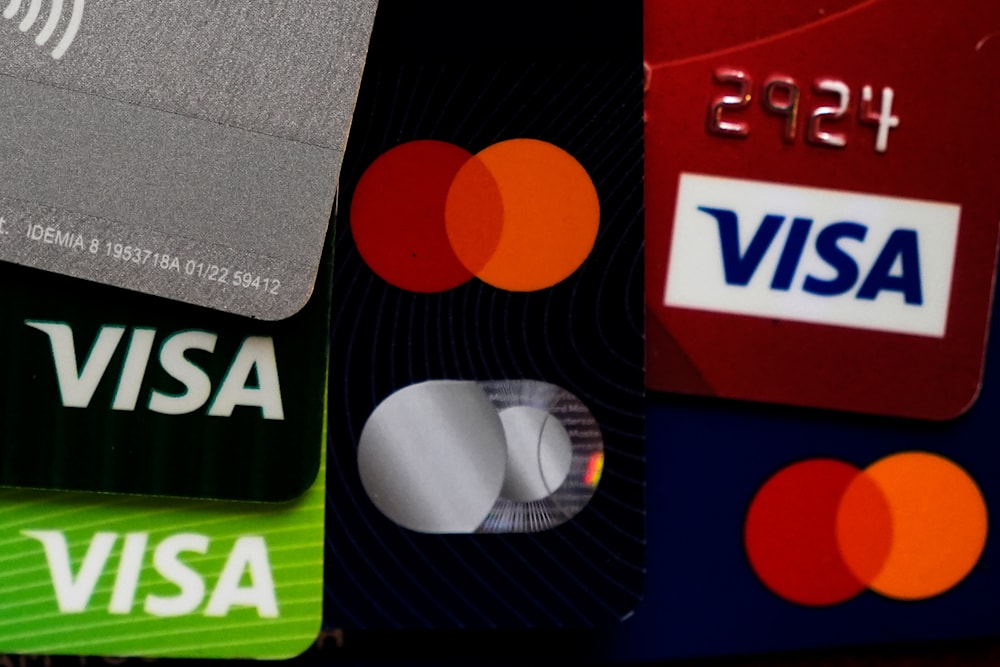Mastercard,Visa linked to illegal gambling scam targeting UK customers
Five popular unlicensed gambling sites in the UK, accused of withholding winnings and targeting problem gamblers, receive millions of visits while Mastercard and Visa continue processing payments despite prior commitments to block such transactions.
-

Several VISA and MASTER credit cards are shown in Buffalo Grove, Illinois, US, on February 8, 2024. (AP)
An investigation on Sunday revealed that Mastercard and Visa are processing payments for illegal gambling websites that are accused of scamming UK customers out of thousands of pounds. The investigation revealed that these payment giants are failing to stop transactions on unlicensed sites, despite previous commitments to do so.
Recently, Mastercard was offered as a payment method, along with cryptocurrency, on nine sites that provide casino games and live sports betting to UK customers. Visa was also available on two of those sites. Both companies are thought to earn small fees with each transaction.
The links between the card companies and the unlicensed sites were exposed in an investigation by Investigate Europe, which uncovered a network of illegal gambling sites operating in parts of Europe.
One customer reported feeling suicidal after losing £60,000 on an unlicensed site, while another man successfully sued a German operator after losing over £200,000, describing the experience as life-shattering.
Read next: Gambling firms secretly sharing user data with Facebook
The nine UK-targeted sites do not have gambling licenses but appear in search results and are promoted on social media. Between October and December, the five most popular sites received around four million visits from the UK. These sites are accused of withholding winnings and targeting problem gamblers with spam.
FatPirate, one such site, has faced several complaints from users who were unable to withdraw their winnings. One UK customer claimed to have won £6,000 but was unable to access the funds.
A customer of another of the unlicensed sites, Gransino, claimed their account had been deleted after they complained about being unable to withdraw winnings. When they contacted support, they were told that it was the end of the matter.
“They take your money and never pay out,” they said, adding that they were “devastated”. Both of the sites were offering Mastercard payments last week.
Industry response and regulatory actions
Mastercard and Visa had agreed to block payments linked to unlicensed operators, entering into a voluntary arrangement alongside PayPal with the Gambling Commission in 2014. The companies are legally obliged to take steps to prevent the use of their networks for criminal activity. But The Observer found them facilitating payments for illicit websites with high traffic, which in some cases have been publicly linked to alleged scams, raising questions about the robustness of their due diligence.
Separately, records of complaints to the gambling watchdog reveal the scale of the illicit market in Britain – there were at least 922 complaints about unlicensed operators in the two years to December, according to documents obtained by Investigate Europe under freedom of information laws. Several complaints mention Mastercard and Visa by name.
Iain Duncan Smith, chair of the parliamentary group on gambling reform, expressed concern over the findings, emphasizing that regulators must take stronger action against unlicensed operators. He also criticized Mastercard and Visa for potentially lending credibility to unregulated gambling sites, urging them to block such transactions immediately.
Mastercard reiterated its zero tolerance policy for illegal activity, promising to investigate and take action on the sites in question while clarifying it had no direct relationship with the gambling sites. It stated that banks were responsible for ensuring merchant compliance.
Visa also condemned illegal activity on its network, emphasizing that it works with partners to remove illegal merchants and invests in technology to enforce compliance, although it too denied direct ties to the gambling sites. Neither company commented on their prior agreement with the Gambling Commission.
Role of PaymentIQ
During testing, payments were made using PaymentIQ, a tool embedded in gambling sites that routes transactions through various financial institutions to increase approval chances. Worldline, which owns PaymentIQ, stated it was a neutral solution with no responsibility for ensuring compliance with regulations.
Professor Heather Wardle, a gambling harm expert, called for accountability from all parties involved in the unlicensed gambling ecosystem.
The Gambling Commission is actively working to disrupt illegal markets, issuing over 770 cease and desist notices and removing 100,000+ URLs. They warned that gambling on unlicensed sites risks data theft and non-payment of winnings.
The Betting & Gaming Council reported that UK gamblers spend over £2.7bn annually on unlicensed sites, posing a growing threat to the legal gambling market.

 4 Min Read
4 Min Read








